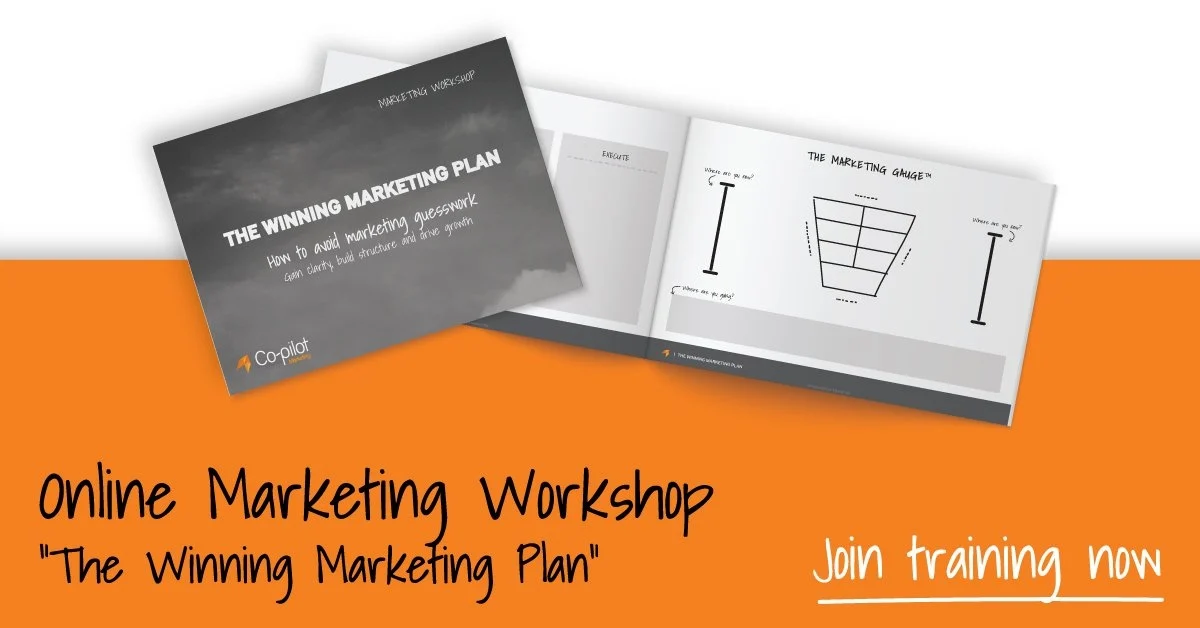What's The Marketing Accelerator?
In 2019 and early 2020, I spent a fair bit of time travelling the country delivering in-person workshops for groups of usually 15-20 people. One of the biggest take-away's for me was the trend towards businesses insourcing more of their marketing.
Why?
Control.
It’s common for small and medium-sized businesses to hand over the keys, so to speak, to a freelancer or agency and say "you do marketing for us". If you've done this and it hasn't worked, and you're about to try again. Or you're considering doing it for the first time, then what we're about to cover will be super helpful.
Now, for context, I’m not saying you have to do everything yourself. If you want to outsource Facebook ads, copywriting, video production, graphic design, or a range of tasks, then I’m all for it. What I’m saying is that you're the pilot, so don’t outsource flying the plane. You’re going to have to indulge me with my flight analogies with this too, I’ve got a couple lined up for you.
You need to build a team; a group of experts who are actively engaged and committed to your plan. But, you need to do this in a way where your business retains control and no-one is irreplaceable.
You hold the keys to the plane, and if there’s a need to make a change to your team, you can do so without everything falling apart.
You're The Pilot
Pilot’s make sure they have the right equipment and are constantly reviewing gauges and dials to make sure the plane is in good working order and that you'll get to your destination. There's too much at stake if they get it wrong.
If your marketing efforts haven’t been successful, then it’s because you haven’t built your buyer persona properly, you don’t have an effective buying process map, you don’t live a methodically built value proposition, and you aren’t measuring and optimising the right things.
We’ve previously talked about the first few points, so let’s discuss the last few.
Do you track performance metrics? If so, are they the right ones? Are they metrics you set, or ones that the agency who is running your marketing set?
There are some tremendous agencies out there; I work with and refer clients to many. But for every great agency, there are 2, 3, or more that have no business charging what they do, for the value they give. They are usually the loudest and most willing to promise the world and deliver a handful of sand. Then, the good agencies and coaches are left to pick up the pieces and deal with the trust issues of a once bitten, twice shy client.
This is why, right from the beginning, you don’t measure your marketing performance on vanity metrics.
Don't Use Vanity Metrics To Measure Performance
Vanity metrics may often be dressed up as good KPI's, because they seem relevant and are measurable. But, they are also things that don’t put 1 cent in your bank account.
#1 google rank positions for obscure terms and number of social media followers are 2 great examples. These things are easy to do poorly, but just because the elements sound good and give you something seemingly impressive to talk about, they are a distraction.
I have to share this side note. A few years back, I worked with a business that was really stuck on the perceived benefit of the google rank positions they held, despite the fact they got no traffic from them. So, I gave him an example of a search term that was relative to his business. I spent 20min writing and optimising a blog post. The next day I asked him to do a google search for the term. The blog post ranked #1. I'm no SEO expert, but there are some very easy tricks that can be used to scam people.
You should be measuring everything from how much to spend to acquire each lead, how much to acquire each customer, what the lifetime value for a client is, and what level of new business and what level of retained business makes up your overall sales and marketing targets. You should measure landing page conversion rates, email opens and clicks, sales conversion rates, webpage bounce rates.
There is a very long list of what you can measure.
The key is that you measure the right things for your business. The things that you can incrementally tweak to get cumulative impacts in the outputs.
I see businesses get caught out because they outsource functions that they don't understand, which means they spend money without determining the value they receive in return. Typically, digital marketing functions like SEO is where people pay money without really knowing what the agency is doing for them.
Or worse still, they've created a situation where the external company can hold you to ransom because they own your domain name for your website or the intellectual property of what your marketing plans are built around.
They are pretty extreme examples, but it happens. Even if you're not held to ransom, it's a messy situation at best, and often businesses have no idea of the risk or the fact it's occurring.
You need to make sure you have clarity and control of every marketing function that is being performed. That still doesn't mean you have to do it.
When you get this all right, one of the great benefits of outsourcing technical functions is that you can develop a team that all operate in their own zones of genius.
You want to define clear positions for your team, each of which has a purpose; a required set of skills and experiences, to perform set tasks.
Then, you’re managing roles.
This is why any individual tactics you develop and deploy need to be grounded in a broader strategy. You need to know why you are doing what you are doing.
Adopting The Pilot & Compass Approach To Marketing
This is why I choose to use a compass as both an analogy and a metaphor for strategic, goal-oriented marketing. So, in this metaphor, why do I want you to aspire to be a pilot? Well, what traits and attributes do you think of when you think of a pilot?
For me, they are exacting. They are skilled. They don’t use guesswork or make things up as they go. They don’t pretend to know what they are doing – they do know what they are doing.
They have a destination, a timeframe to get there and a plan to make sure they do.
Now….visualise the cockpit of a plane. There are heaps of dials and instruments, one of which is a compass.
As a pilot, you use a compass to know when you’re heading in the right direction, and when you’re heading in the wrong direction. A compass is not ambiguous, or open to interpretation – it keeps you aligned and focussed on the path ahead.
What happens if a plane takes off with an underprepared pilot and no compass?
Well, you might run out of fuel, crash into unforeseen objects, arrive at the wrong destination, or arrive late.
So, what happens when an underprepared marketer takes off without a solid foundation for a successful strategy?
You might run out of money, or make avoidable and costly mistakes or miss targets and miss deadlines.
This is why you want to be a pilot; why you need to build internal marketing capabilities in your business.
Be a Better Pilot. Calibrate Your Compass.
Next month we're starting a new Marketing Compass Accelerator group. We will work with a group of service-based businesses to help them build and implement a profitable and scalable marketing plan.
If you want to join us, send me an email with the word "Accelerate", and I'll get in touch with details……







Speak Your Mind